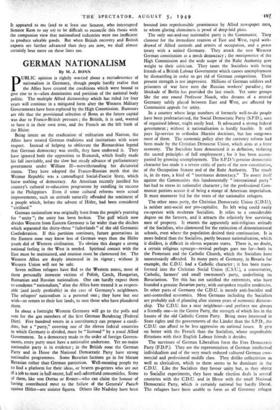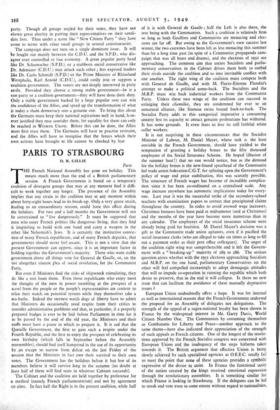GERMAN NATIONALISM
By M. J. BONN
PUBLIC opinion is rightly worried about a recrudescence of nationalism in Germany, though people hardly realise that the Allies have created the conditions which were bound to give rise to it—alien domination and partition of the national body politic. The multiple Allied dictatorship which has ruled for four years will continue in a mitigated form after the Western Military Governments have been replaced by the High Commission. Rumours are rife that the provisional selection of Bonn as the future capital was due to Franco-British pressure ; the British, it is said, wanted to have it in their own zone, and the French on the left bank of the Rhine.
Being intent on the eradication of militarism and Nazism, the Allies have treated Getman traditions and institutions with scant respect. Instead of helping to obliterate the Bismarckian legend that German democracy was sterile, they have endorsed it. They have ignored both the opposition to Bismarck, which finally made his fall inevitable, and the slow but steady advance of parliamentary government under William II—notwithstanding his dictatorial stunts. They have adopted the Franco-Russian myth that the Weimar Republic was a camouflaged Social-Fascist State, which knew nothing of democracy. An American recently justified his country's cultural re-education programme by extolling its success in the Philippines. Even if some cultural reforms were actual improvements, such an attitude naturally offended the sentiment of a people which, before the advent of Hitler, had been considered "civilised."
German nationalism was originally born from the people's yearning for " unity "; the unity has been broken. The gulf which now divides Western from Eastern Germany is far wider than the ditches which separated the thirty-three " fatherlands " of the old Germanic Confederation. If this partition continues, future generations in the Eastern zone may know less of German ways than the Hitler youth did of Western civilisation, To obviate this danger a strong national feeling in the West is needed. Spiritual contact with the East must be maintained, and reunion must be clamoured for. The Western Allies arc deeply interested in its vigour ; without it Western Union will not be safe.
Seven million refugees have fled to the Western zones, most of them personally innocent victims of Polish, Czech, Hungarian, Rumanian and Russian nationalism. One can hardly expect them to condemn "nationalism," after the Allies have treated it as respect- able (and justly profitable) in the case of Germany's neighbours. The refugees' nationalism is a personal one ; they have but one wish—to return to their lost lands, to oust those who have plundered them.
In about a fortnight Western Germany will go to the polls and vote for the aco members of the first German Bundestag (Federal Diet). Five hundred voters in a constituency can propose a candi- date, but a " party," covering one of the eleven federal countries in which Germany is divided, must be " licensed " by a zonal Allied Government. In a democracy made to the order of foreign Govern- ments, every party must have a nationalist undertone. Yet no major nationalist party is in evidence ; in the British zone the German Party and in Hesse the National Democratic Party have strong nationalist programmes. Some Bavarian factions go in for blatant Bavarian rather than German patriotism. Well-meaning people try to find a platform for their ideas, or brazen go-getters who are out of a job to meet in half-secret, half well-advertised conventicks. Some of them, like von Ostrau or Reiner—who can claim the honour of having contributed most to the failure of the Generals' Putsch against Hitler—arc sinister figures. Others like Nadolny have been boosted into reprehensible prominence by Allied newspaper men, to whom glaring clumsiness is proof of deep-laid plots.
The only out-and-out nationalist party is the Communist. They clamour for the immediate reunion of East and West, rapid with- drawal of Allied controls and armies of occupation, and a peace' treaty with a united Germany. They attack the new Western German constitution as a mock democracy ; the omnipotence of the High Commission and the wide scope of the Ruhr Authority give weight to their criticism. They taunt the Socialists with being friends of a British Labour Government which causes unemployment by dismantling in order to get rid of German competition. Their present strength is not impressive. Millions of German soldiers and prisoners of war have seen the Russian workers' paradise ; the blockade of Berlin has provided the last touch. Yet some groups like the one round Professor Noack, who dreams of a neutral Germany safely placed between East and West, are affected by Communist appeals for unity.
In a country where large numbers of formerly well-to-do people have been proletarianised, the Social Democratic Party (S.P.D.), sure of organised labour, might easily lead. It advocated a strong federal government ; without it nationalisation is hardly feasible. It still pays lip-service to orthodox Marxist doctrines, but has outgrown most of them. The economic policy after the currency reform had been made by the Christian Democrat Union, which aims at a freer economy. The Socialists have denounced it as deflation, violating the sacred principles of full employment ; for it has been accom- panied by growing unemployment. The S.P.D.'s genuine democratic character has made it a severe critic of parts of the new constitution, of the Occupation Statute and of the Ruhr Authority. The result is, in its eyes, a kind of " incestuous democracy." To assert itself against the Communists this fundamentally " international party " has had to stress its nationalist character ; for the professional Com- munist patriots accuse it of being a stooge of American imperialism. It must moreover bid for the votes of the nationalist refugees.
The other mass party, the Christian Democratic Union (C.D.U.), is neither anti-social nor pro-capitalist. Its left wing could easily co-operate with moderate Socialists. It relies to a considerable degree on the farmers, and it attracts the relatively few surviving men of property. It resents the apparently anti-religious attitude of the Socialists, who clamoured for the extinction of denominational schools, even where the population desired their continuation. It is more federal than the Socialists, partly because nationalisation, which it dislikes, is difficult in eleven separate states. There is, no doubt, a certain religious upsurge—revival perhaps goes too far—both in the Protestant and the Catholic Church, which the Socialists have unnecessarily offended. In many parts of Germany, in Bavaria for example, the C.D.U. had a Catholic character ; it has been trans- formed into the Christian Social Union (C.S.U.), a conservative, Catholic, farmers' and small townsmen's party, underlining its Bavarianism. Yet this has not satisfied the extremists, who have founded a genuine Bavarian party, with outspoken royalist tendencies. In other parts of Germany the C.D.U. is merely anti-Socialist and anti-controlled economics. Most Germans including the Socialists are probably sick of planning after sixteen years of economic dictator- ship. The C.D.U. has a near neighbour—and perforce not always a friendly one—in the Centre Party, the strength of which lies in the haunts of the old Catholic Centre Party. Bring more interested in State rights and the governments of the Lander than the S.P.D., the C.D.U. can afford to be less aggressive on national issues. It gets on better with the French than the Socialists, whose unprofitable flirtations with their English Labour friends it derides.
The survivors of German Liberalism form the Free Democratic Party (F.D.P.). They are the representatives of German intellectual individualism and of the very much reduced cultured German com- mercial and professional middle class. They dislike collectivism as well as clericalism, which to them seems to be dominant in the C.D.U. Like the Socialists they favour unity but, as they object to Socialist experiments, they have made election deals in several countries with the C.D.U. and in Hesse with the small National Democratic Party, which is certainly national but hardly liberal. The refugees have been unable to form an all Germany refugee
party. Though all groups angled for their votes, they have not shown great alacrity in putting their representatives on their candi- date lists. Thus under a name like " New Citizen Party " they have come to terms with other small groups in several constituencies.
The campaign does not turn on a single dominant issue. It will 'be fought out mainly between the C.D.U. and the S.P.D., who dis- agree over controlled or free economy. A great popular party head like Dr. Schumacher (S.P.D.), or a stubborn social conservative like Dr. Adenauer (C.D.U.) may attack each other ; less exposed leaders like Dr. Carlo Schmidt (S.P.D.) or the Prime Minister of Rhineland Westphalia, Karl Arnold (C.D.U.), could easily join or support a coalition government. The voters are not deeply interested in party strife. Provided they choose a strong stable government—be it a one-party or a coalition government—they will have done their duty. Only a stable government backed by a large popular vote can win the confidence of the Allies, and speed up the transformation of what is today a sham democracy into a genuine one. To bring this about the Germans must keep their national aspirations well in hand, haw- ever justified they may consider them, for equality for them can only be reached in Western Union. Before this can be done, the Allies must first trust them. The Germans will have to practise restraint, and the Allies will have to recognise that the forces which their own actions have brought to life cannot be checked by fear



































 Previous page
Previous page